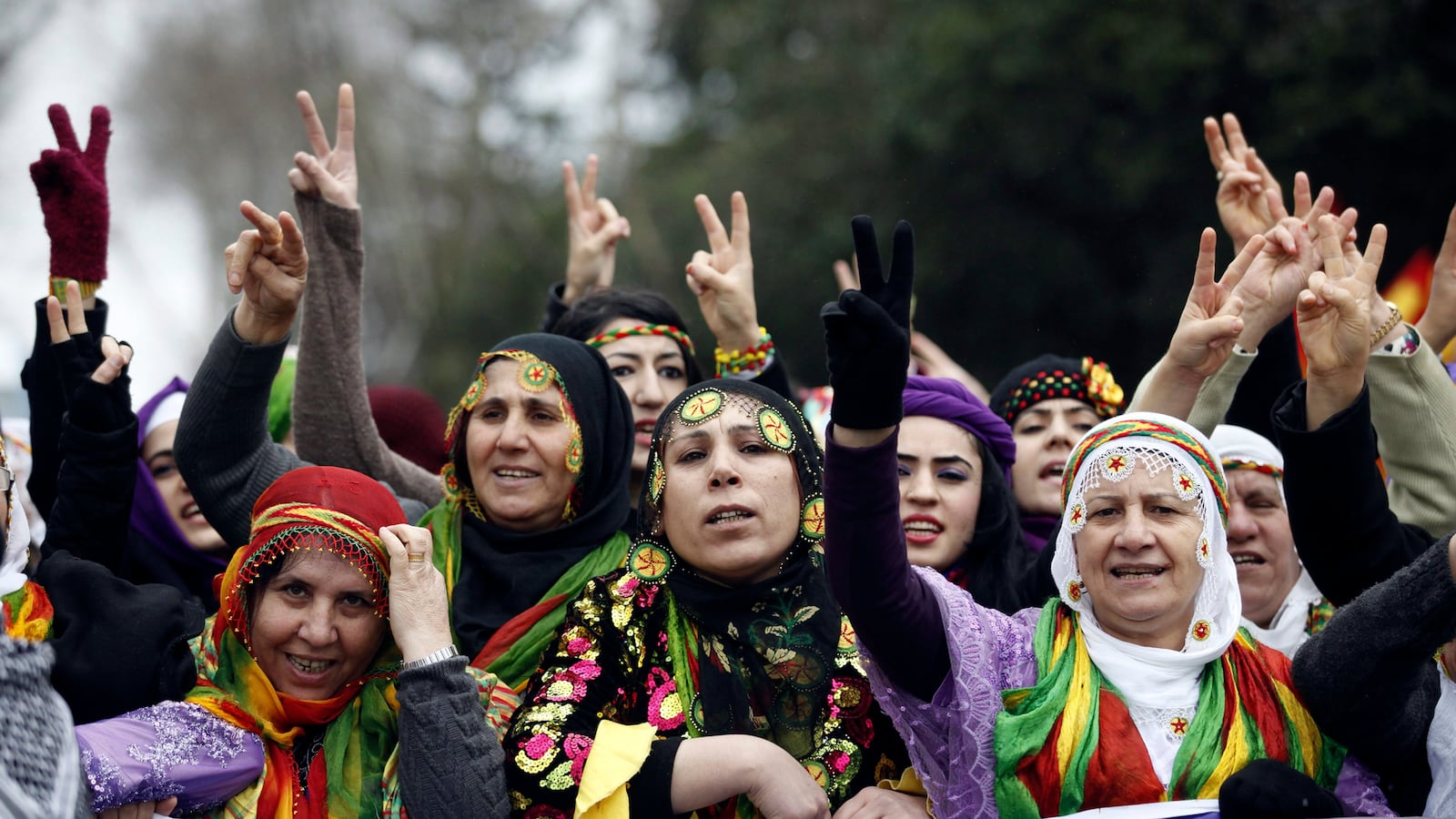Residents of an upscale Istanbul neighborhood flocked to their windows this month to watch a neighbor brutally beat his wife. One onlooker—a European woman—recounted the woman’s screams and her neighbors’ apathy in a post to an Istanbul Facebook group.

“I asked one of the neighbors to call the police but she refused and continued watching, like it was a soap opera,” the woman wrote. “It seems violence is a normal thing here, and nobody cares!!”
The post generated more than 100 comments, many from fellow Westerners who said that they too had been disturbed by violent scenes they couldn’t imagine unfolding back home: diners and waitstaff politely ignoring a man slapping his date in the face; pedestrians strolling past a public assault on a woman; a shopkeeper shrugging off a news report about a man slicing his wife’s nose off her face. “That’s Turkey,” a woman recalled the vendor saying.
Violence against women is a pervasive problem in Turkey that affects nearly 40 percent of the country’s female population, according to widely cited 2009 study. It is behind 20 percent of divorces, according to a recent government survey, and has claimed at least 120 lives since January 1 alone, an increase from the same period last year, according to several Turkish NGOs and data from Bianet, a news site that tallies killings reported in the media. It spans class and location, even making its way onto mainstream TV, as it did in May when a dating game show contestant revealed, on air, that he had killed his wife and later axed his lover to death.
Turkey’s chronic domestic violence was among the frustrations that prompted a group of women’s rights activists—seven women and two men—to escalate their fight for gender equality last month by launching what could become the country’s first-ever women’s political party to participate in general elections.
The founding members of Kadin Partisi, or Women’s Party, reasoned the country was in need of a radical cultural shift that would only happen with more women in positions of power. As traditional activists, they could only do so much—aid women after they had been beaten; fight discriminatory policies after they had been written; offer advice and hope it might be heeded. But a party that could fill the seats of government with women, they believe, could finally balance a masculine culture that permeates the rest of the country.
“We are 50 percent of the population,” Fusun Yurtman, a founding board member, said in an interview with The Daily Beast. “Yet males are making decisions about women’s issues from the moment they’re born. Even from conception,” she added, referring to government attempts to limit access to abortions.
Turkey’s political system is overwhelmingly male, with women accounting for just 14 percent of the seats in parliament and an even smaller sliver of local government positions, according to data from Kader, a group that tracks women’s participation in politics. Men also dominate the judiciary and police force—which should be strong lines of defense for victims of domestic violence, but which critics instead characterize as boys’ clubs that go easy on men when it comes to “family disputes.”
“The problem is in the application, the interpretation of law,” said Fatma Aytac, another founding member, adding that cops and courts tend to view men as the head of the family and take their word over their wives’. “Police come from this culture. Everyone comes from this culture.”
The party also points a reproachful finger at Turkey’s populist prime minister, Recep Tayyip Erdogan, for perpetuating the country’s machismo through routine off-the-cuff morality rants: about how abortion is murder, C-sections are unnatural, co-ed dorms are breeding grounds for vice, and how every woman should have three children. These statements, the party founders say, serve as a disturbing model for Erdogan supporters, whether his opinions find their way into policy or not.
Whatever Erdogan’s influence on Turkey’s masculine culture may be, the country’s gender fault lines long predate his time in power. Domestic violence, for example, has provided thematic fodder for generations of writers and filmmakers. Turkish author Elif Shafak begins her novel Honor, a story about women murdered for shaming their families, with a childhood memory about a neighbor who beat his wife. “In the evenings we listened to the shouts, the cries, the swearing. In the morning we went on with our lives as usual. The entire neighborhood pretended not to have heard, not to have seen.”
More recently, however, Shafak has expressed optimism about a growing grassroots movement in Turkey to acknowledge and end violence against women. “More and more public figures are coming out to say that domestic violence is everyone’s business and we should, as a society, interfere,” she wrote in a 2011 Guardian article.
Zeynep Kandur, who works for the women’s branch of Erdogan’s Justice and Development Party, has also observed many improvements over the years. “Twenty years ago you wouldn’t report domestic violence,” she said. “You wouldn’t tell your own mother-in-law.” Through the bleakness of rising domestic violence statistics, she sees a positive sign: More women and families are now reporting these sorts of crimes rather than sweeping them under the rug.
She also defends Erdogan against accusations of machismo, arguing that he has consistently pushed for more women in the party and that, since he took power in 2003, female representation in parliament has increased from 4 to 14 percent.
The founders of Kadin Partisi, however, see women in male-dominant political parties as subordinate to the parties’ masculine agendas. “They apply the parties’ policies, they collect the votes for men,” Yurtman said.
The Women’s Party itself, the founders point out, does not plan to simply turn the tables and exclude men from their agenda. While boosting female representation in politics is a top priority, the party bills itself as a body striving for universal equality and eager to fight discrimination in any form.
To realize their vision, the party will first have to raise enough money to build branches across the country—a necessity if they want a shot at participating in next year’s parliamentary elections. A pioneering women’s party established in Turkey in the 1970s failed to cross this critical threshold.
On a recent sweltering Thursday afternoon several founders hunched over a table brainstorming how to do exactly that. They had launched too late to prepare for the country’s August presidential elections—which Erdogan is expected to win, extending his influence for at least another five years—but were optimistic, looking ahead to 2015.
They said they had been well received by women on visits throughout the country and they reasoned that if they could get just one supporter per household, they’d be in business. “We can easily convince them,” Aytac said.






